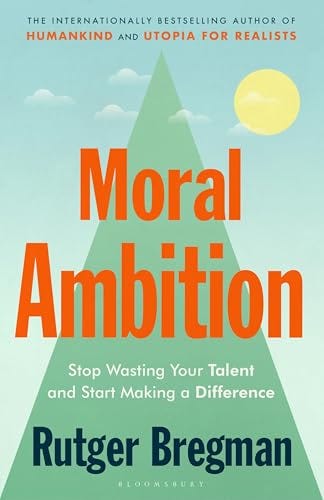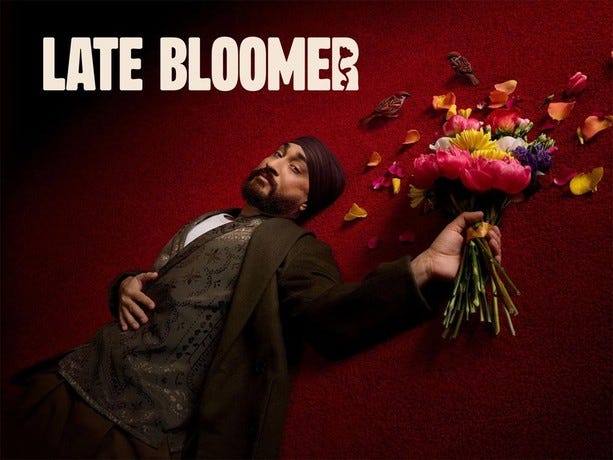Moral Ambition, sacrificing efficiency for meaning, Late Bloomer, and Positive Peace Index (weekly wrap #18)
How to seek and find inspiration, check the wall your ladder is leaning against, prioritise meaning, and reconnect with yourself.
Something I’ve been reading
I don’t write book reviews and this isn’t one, but I’m currently reading this book and there are a couple of things I really like about it. Most notably so far, it tells a lot of stories in a very simple but captivating way.
Whilst it is a non-fiction book, using fascinating stories from the nooks and crannies of history, it stays grounded in the point it’s making without coming across as preachy or overly intellectual.
Also it has a refreshingly anti-hustle-culture take, despite what the subtitle on the cover of the book might have you expect.
It’s not just an alternative version of ‘you’re a loser who isn’t doing enough with your life’ - Bregman actually makes that point that you don’t necessarily need to do all that much more than what you’re currently doing to live a life that is more aligned to your talents and allows you to contribute to the world in more meaningful ways.
To reference a quote Bergman cites right at the start of the book, at the very top of the prologue:
“I cannot believe that the purpose of life is to be ‘happy’. I think the purpose of life is to be useful, to be responsible, to be honorable, to be compassionate. It is, above all, to matter: to count, to stand for something, to have it make some difference that you lived at all.”
- Leo Rosten, writer (1908–1997)
And a quote he cites at the top of the first chapter:
“People may spend their whole lives climbing the ladder of success only to find, once they reach the top, that the ladder is leaning against the wrong wall.”
- Allen Raine, writer (1836–1908)
If you know me well enough, or have been reading my content for a while, you’ll know that I very much believe in the first concept, with the caveat that I believe striving to be useful, responsible, honourable, and compassionate is a surer way to sustainable happiness than anything else.
And that I really care about what wall my ladder is leaning against, and checking it fairly regularly.
Something I’ve been listening to and pondering
I didn’t think about this before writing this wrap, but the other thing I wanted to share is strongly aligned with the above too. It flows very nicely. I recently listened to a podcast interview Tim Ferris had on his show with Stephen West of the popular podcast Philosophize This!.
There was a part of the conversation that resonated a lot with me (very similar to the ladder and wall idea) that I took a clip of it. It’s just 57 seconds.
Here’s the clip, but can definitely recommend the entire conversation too.
I won’t say more but if you do end up listening even just to this short clip, let me know what you think. I’d be very keen to discuss this with more people.
Something I’ve been watching
This is an amazing series that I would bet 99% of my readers have never heard of. I just finished season 2. Again, this isn’t a review but let me tell you a little bit about Late Bloomer.
“Inspired by Raina's life as a Punjabi Sikh millennial and online celebrity, the show follows burgeoning content creator Jasmeet Dutta as he tries to balance his ambitions for success with his commitment to family, community and culture.”
- from the show’s IMDB page
This is an extremely simplistic description of the basic premise though. This show is a masterpiece of writing, directing and acting, especially coming from basically an indie team of barely-professional filmmakers, which happens to give representation to a very small niche of society - mostly Punjabi Sikh migrants who grow up as third culture kids in western cities like Toronto (or Sydney for that matter! - and struggle to find themselves, their relationship with their background, their foreground, their side-ground, and… AND… what the perspectives are from people living through completely different circumstances too.
As much as the show has comedy weaved in, and there are some subtle stereotype jokes here and there that if-you-know-you-know, it never actually resorts to painting insensitive caricatures just for the sake of a joke (in my opinion anyway).
If you’ve ever watched Donald Glover’s Atlanta or Aziz Ansari’s Master of None, you might have a sense of what this show is going for. Except it’s speaking very intimately to a group of society that I believe would never in a million years think they’d get this kind of representation and relatability on a (primarily) English language series. I know this because I’m one of those people!
Jeez, there’s so much I could say about this show, I’m actually bursting to talk about it with more people who have seen it but unfortunately the marketing and PR behind this show was really pathetic. I don’t think you can even legally stream it anywhere outside of US and Canada.
I will share one thing with you though. Not a trailer or an extensive clip, but this scene commentary by Jasmeet - the main character and creator of the show. It’s a very short scene and not a spoiler by any means, but it really speaks to the relatability for me.
I have actually had almost this EXACT same experience, except it was on a train, the kid was a boy with his mother, and I got “alien” not “pirate”. You’ll know what I’m talking about when you watch this.
If you happen to watch this, please, please, please let me know and let’s chat!
Something new (to me) I’m exploring
The Positive Peace Index (PPI) is a measure developed by the Institute for Economics & Peace (IEP), which also publishes the Global Peace Index. You can find it featured on the Vision of Humanity website.
Unlike traditional measures of peace that focus mainly on the absence of violence (negative peace), the PPI digs deeper into the foundations that make peaceful societies more resilient and sustainable, which is what they call positive peace.
My friend - same one that helped me find my mechanical keyboard - put me on to this, and the thing that captivated me about this even more so than the data and graphics and concept is that this is actually an amazing story of moral ambition!
You see, the Positive Peace Index wasn’t born in a policy lab or an academic think tank. It began with one man, Steve Killelea, who happened to be an Aussie tech entrepreneur that had built his fortune in the IT industry and wasn’t a political scientist or peace activist by trade. He was a businessman with a global mindset, and just had a growing sense that something was deeply off in the world.
After making his mark in tech, Steve turned his focus to philanthropy and development, funding projects across Africa and Asia. And the more time he spent in conflict-affected areas, the more he started asking one powerful question:
“What are the most peaceful countries in the world, and what makes them that way?”
To his surprise, no one could really answer it.
There were mountains of data on war, terrorism, and violence, but almost nothing on peace. It was like trying to study health by only looking at disease.
So in 2007, Steve founded the Institute for Economics & Peace (IEP) and launched the Global Peace Index (GPI), the first-ever ranking of countries by their level of peacefulness.
But that was just the beginning.
As the GPI gained attention globally, Steve noticed something interesting. Measuring violence (what we call negative peace) was useful, but it didn’t explain why some countries stayed peaceful while others fell apart.
So Steve started to then wonder:
“What if we could reverse engineer peace? What if we could measure what actually makes peace possible?”
This became his obsession.
The IEP dove into years of data, analysing the “DNA” of peaceful societies across time and culture. And what they found was eye-opening: peace wasn’t random. It had a structure - eight consistent pillars that kept showing up wherever peace thrived.
That discovery became the Positive Peace Index, which is now a practical, data-driven blueprint for building societies that are fairer, more inclusive, and more resilient.
I haven’t gotten into how the application of the PPI is tracking these days but this story is so inspiring to me. Someone found an itch of curiosity and they set out to scratch it, with a hunch that it might actually help make the world a better place.
This story says so much about the power of curiosity, asking good questions, and nurturing moral ambition when it’s practical to do so.
I acknowledge Steve was already a wealthy philanthropist who had time and resources that many of us do not. But so do a lot of people who set up a foundation and regular appointments with their tax accountant and call it a day.
There really aren’t that many Steve Killeleas in the world, and it’s so awesome to stumble upon one (and a whole new concept alongside it) so organically IRL, in your home country, and with just a couple of degrees of separation. Thanks Andrew for introducing me to this!
It’s been a pretty big week or 2 actually in terms of inputs. I have a lot more I could include in this wrap that I’m choosing to leave out. The funny/ironic thing is that I recently had a fantastic conversation with Josh Stinton on my podcast and a lot of the conversation was about our over-saturation with inputs that get in the way of being able to connect with ourselves and greater inspiration.
I’m going to be taking that thought to heart over the next couple of weeks.
In the meantime, wishing you a nice weekend.
Dev
P.S. If you enjoyed this wrap, please do hit the like button at the very least. It makes a difference. If you want to take your support to the next level, share it with someone you think might be interested in any of it.







